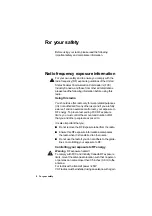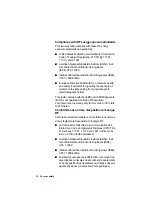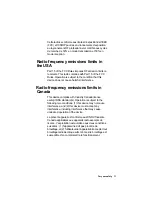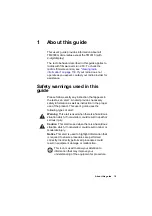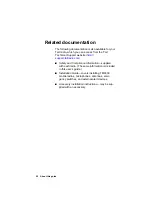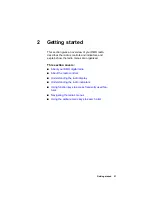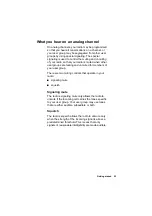
For your safety 9
of up to 5.15 dBi.
UHF and 800 MHz radios must be installed using an
antenna with a gain of up to 5.65 dBi.
900 MHz radios must be installed using an antenna with a
gain of up to 8 dBi.
For radios with a transmit power of 25 W:
The radio must be installed using an externally mounted
antenna with a gain of up to 5.15 dBi.
This radio emits radio frequency (RF) energy or radio
waves primarily when calls are made. RF is a form of
electromagnetic energy (as is sunlight), and there are
recommended levels of maximum RF exposure.
To control your exposure to RF and comply with the
maximum exposure limits for occupational/controlled
environments, follow these guidelines:
■
Do not talk (transmit) on the radio more than the rated
transmit duty cycle. This is important because the
radio radiates more energy when it is transmitting
than when it is receiving.
■
While you are transmitting (talking or sending data) on
the radio, you must ensure that there is always a dis-
tance of 35 inches (0.9 m) between people and the
antenna. This is the minimum safe distance.
■
Use the radio only with Tait-approved antennas and
attachments, and make only authorized modifications
to the antenna otherwise you could damage the radio
and violate FCC regulations.
For more information on what RF energy is and how to
control your exposure to it, visit the FCC website at
www.fcc.gov/oet/rfsafety/rf-faqs.html
.
Health Canada warning statement
The installer of this radio equipment must ensure that the
antenna is located or pointed such that it does not emit an
RF field in excess of Health Canada limits for the general
population; consult Safety Code 6, obtainable from the
Health Canada’s website
.
Summary of Contents for TM9355
Page 1: ...TM9300 DMR Mobile Radios User s Guide MMB 00001 11 Issue 11 August 2020...
Page 2: ......
Page 150: ...150 Tait Software License Agreement...
Page 151: ......
Page 152: ......








